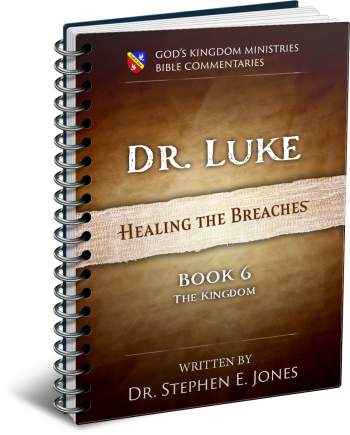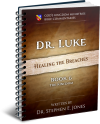Latest Posts
View the latest posts in an easy-to-read list format, with filtering options.

This is a commentary on Luke 15 to 18:30, explaining the Parables of the Kingdom and Jesus' commentary on those parables.
Category - Bible Commentaries

In Luke 17:20 the Pharisees asked Jesus when the kingdom of God was coming. Their intent was to examine Jesus, even as a doctor would examine a sick patient. Jesus told them that the kingdom of God would not come in a way that could be seen with such a bad attitude. They would not be able to say, “Look, here it is!” as if discovering a major symptom of a doctrinal disease in Jesus. Rather, the Kingdom was standing right in front of them, for where He is, there is the Kingdom.
In Luke 17:24 Jesus also explained that the Kingdom would come as the dawn of a new day. As the sun moves across the sky—from east to west, as Matt. 24:27 says—becoming brighter and brighter, so also would the Kingdom increase over time.
The next illustration that Jesus gives us is the parallel with the days of Noah. Luke 17:26, 27 tells us,
26 And just as it happened in the days of Noah, so it shall be also in the days of the Son of Man: 27 They were eating, they were drinking, they were marrying, they were being given in marriage, until the day that Noah entered the ark, and the flood came and destroyed them all.
In other words, the majority of the people in Noah’s day were living normal lives, oblivious to the momentous event that was about to take place. In Matthew’s account, we are told that “they did not understand until the flood came and took them all away” (Matt. 24:39). Even as the flood surprised them, so also will the dawn of this new day surprise nearly all of the people today.
Noah himself was given warning 120 years before the flood (Gen. 6:3). When the time of judgment drew near, he was given seven final days of preparation to bring his family and the animals into the ark (Gen. 7:4).
This may speak prophetically of the seven days of the feast of Tabernacles in our time, followed by the start of the “rain” of the Holy Spirit on the eighth day of the feast. The story of Noah’s flood is a prophecy of the flood of the Holy Spirit, for God promised that the knowledge of the glory of God will cover the earth (Hab. 2:14).
The purpose of Noah’s flood was to remove the breath (ruach, “spirit”) of life from all flesh (Gen. 6:17). Conversely, the purpose of the flood of the Holy Spirit was to put the Spirit of God back into all flesh. This was illustrated and defined in Genesis 8, beginning with the highly charged prophetic statement in verse 1, “and God caused a wind (ruach, “spirit”) to pass over the earth, and the water subsided.”
In other words, the Spirit of God was the solution to the effects of Noah’s flood, which had removed the Spirit of God from all flesh.
Noah then sent out three doves (or perhaps he sent out the same dove three times). Genesis 8:8-12 says,
8 Then he sent out a dove from him, to see if the water was abated from the face of the land; 9 but the dove found no resting place for the sole of her foot, so she returned to him into the ark; for the water was on the surface of all the earth. Then he put out his hand and brought her into the ark to himself. 10 So he waited yet another seven days; and again he sent out the dove from the ark. 11 And the dove came to him toward evening; and behold, in her beak was a freshly picked olive leaf. So Noah knew that the water was abated from the earth. 12 Then he waited yet another seven days, and sent out the dove; but she did not return to him again.
These three doves represent the three feasts of the Lord, which are accompanied by three levels of anointing by the Holy Spirit. The anointing of Passover begets Christ in us by the Holy Spirit. The anointing of Pentecost is a greater anointing, designed to mature that holy seed that was begotten in us. The anointing of the feast of Tabernacles is the greatest and final anointing that brings Christ to birth in us in a visible way known as the manifestation of the sons of God.
Historically speaking, there are also three occasions in which the Holy Spirit (as a dove) is to be sent into the earth. The first was at Mount Sinai, when God came down as fire upon the mount and spoke the Ten Commandments to the people. This dove, however, “found no resting place for the sole of her foot,” because the people refused to hear His voice (Exodus 20:18-21). Hence, the Spirit was placed in the Ark of the Covenant, even as the first dove returned to Noah’s ark.
The second dove was sent on the day of Pentecost in Acts 2. On this occasion, a small remnant of 120 people received the Holy Spirit, not wanting to make the same mistake as their forefathers under Moses. They are the “freshly picked olive leaf” in the beak of the second dove. It was a good start, but the work of the Spirit was not yet completed.
The third dove is that which will yet be poured out at the historic fulfillment of the feast of Tabernacles. Only then will the Spirit be manifested fully in the sons of God. Like Noah and his family, the sons of God will emerge from the presence of God—the Ark of the Covenant—and begin to subdue all things under the feet of Christ.
When Jesus prophesied that the latter days would be similar to the days of Noah, this covered a broad swath of time. The days of Noah were very corrupt before the flood, but after the flood the earth was subdued. So also will it be at the time of the coming of the Son of Man. At the present time of writing, the earth is the same as in Gen. 6:11, 12,
11 Now the earth was corrupt in the sight of God, and the earth was filled with violence. 12 And God looked on the earth, and behold, it was corrupt; for all flesh had corrupted their way upon the earth.
The watery flood subdued the earth in Noah’s day, but the second flood will subdue the earth in a more positive manner—by the wind of the Holy Spirit. This is the promise of God in Genesis 9, where God made a covenant—a vow—with the whole earth not to destroy it by water again. Some have interpreted this legalistically, as if God will destroy the earth with fire, rather than water. But this interpretation violates the whole spirit of the passage. Gen. 9:8-10 says,
8 Then God spoke to Noah and to his sons with him, saying, 9 “Now, behold, I Myself do establish My covenant with you, and with your descendants after you; 10 and with every living creature that is with you, the birds, the cattle, and every beast of the earth with you; of all that comes out of the ark, even every beast of the earth.”
This covenant was made not only with man but with all four of the living creatures (“beasts”) that represent creation at the throne of God (Rev. 4:7). The eagle is the king of the birds, the ox is the king of the cattle, and the lion is the king of the beasts of the earth. Along with man, these are the four living creatures representing the whole earth.
These are the same four beasts seen in Ezekiel’s vision (Ez. 1:10). They are also represented on the banners of the four leading tribes of Israel that surrounded the tabernacle. The banner of the man flew over Reuben to the south; the lion flew over Judah to the east; the ox flew over Ephraim to the west; and the eagle flew over Dan to the north.
Essentially, this was a covenant (oath) that God made with the whole earth, as Gen. 9:13 and 17 says about the sign of that covenant:
13 I set My bow in the cloud, and it shall be for a sign of a covenant between Me and the earth… 17 And God said to Noah, “this is the sign of the covenant which I have estab-lished between Me and all flesh that is on the earth.”
The scope of the Noahic covenant is the same as the extent of the flood. Both affected “all flesh that is on the earth,” but in opposite ways. One was adverse, but the other beneficial. One removed the breath (Spirit) of God; the other puts the Spirit back into the earth.
Therefore, when Jesus spoke of the days of Noah, he was not prophesying only of destruction, but also of renewal. There will indeed be destruction in Judea and Jerusalem, as the overall context of Luke 17 and Matthew 24 portray in great detail. Yet we are not left without hope, first because some were saved through the flood, and secondly because the final flood is subject to the unconditional covenant that God made through Noah with the whole earth.